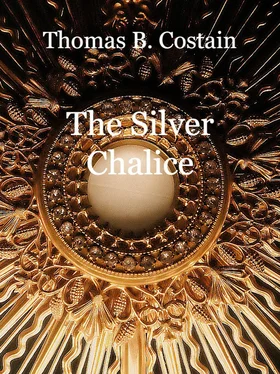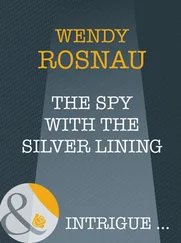Thomas B. Costain - The Silver Chalice
Здесь есть возможность читать онлайн «Thomas B. Costain - The Silver Chalice» — ознакомительный отрывок электронной книги совершенно бесплатно, а после прочтения отрывка купить полную версию. В некоторых случаях можно слушать аудио, скачать через торрент в формате fb2 и присутствует краткое содержание. Жанр: unrecognised, на английском языке. Описание произведения, (предисловие) а так же отзывы посетителей доступны на портале библиотеки ЛибКат.
- Название:The Silver Chalice
- Автор:
- Жанр:
- Год:неизвестен
- ISBN:нет данных
- Рейтинг книги:5 / 5. Голосов: 1
-
Избранное:Добавить в избранное
- Отзывы:
-
Ваша оценка:
- 100
- 1
- 2
- 3
- 4
- 5
The Silver Chalice: краткое содержание, описание и аннотация
Предлагаем к чтению аннотацию, описание, краткое содержание или предисловие (зависит от того, что написал сам автор книги «The Silver Chalice»). Если вы не нашли необходимую информацию о книге — напишите в комментариях, мы постараемся отыскать её.
The Silver Chalice — читать онлайн ознакомительный отрывок
Ниже представлен текст книги, разбитый по страницам. Система сохранения места последней прочитанной страницы, позволяет с удобством читать онлайн бесплатно книгу «The Silver Chalice», без необходимости каждый раз заново искать на чём Вы остановились. Поставьте закладку, и сможете в любой момент перейти на страницу, на которой закончили чтение.
Интервал:
Закладка:
The merchant watched in silence for several moments and then gave his head a shake. “It’s clear you have no reason, my son, to be proud of your muscular development,” he said. He seemed to find some discontent in this, and it was several moments later that he added: “But I didn’t select you as a thrower of the discus. It was your spirit that I liked. Why should I be concerned now that you are as thin as a lath? You will be much like my father, who was never a strong man.” He seemed to have discarded now all feeling of disparagement. “You are going to be tall, and that is what counts. I think you will be taller than all the sons of the men I call my friends.”
4
Basil spent his seventeenth birthday finishing a gift for his father. He and his mother were making a joint offering of it. Persis had placed a fine ruby in his hand and suggested that he design a ring to hold it. He had decorated a narrow band with views of the Acropolis and had taken very special pains to make the stone show to advantage. To assist the red gold, which was to serve as the foil beneath, he had covered it with velvet of a deep wine shade and had placed the ruby on that, with the result that it glowed in an unnatural splendor. Delighted with the success of his experiment, Basil had said to his mother, “No king in the world has a ring on his finger to equal this one.”
But the gift did not arouse in Ignatius the pleasure and gratification the two donors had anticipated. He looked at it so long in silence that Basil raised his own eyes from the ring to see what the matter could be. He discovered then that the face of the merchant was drawn and gray and that his neck, which had been as round and firm as a column of stone, had a flaccid look to it.
“Are you ill?” he asked with sudden anxiety.
“Blind! Blind!” said the merchant bitterly, as though speaking to himself. “I have been stupid, my son. I have wanted you to give all your time to making beautiful things like this, thinking that in due course I would teach you what you will need to know when you take my place. But will there be time? Here I am, with a pain like a hot iron in my side and the fear of death on me. And what do you know of the care of the groves, of the sailing of ships, of the accounts? I have been deliberately blind! And now perhaps it is too late.”
Two days afterward he was dead. The white marble house fell into silence. No sound rose from the slave quarters; no one moved in the halls. A cautious hand had turned off the water which ran in the pipes, and so even the light ripple of the fountains ceased to be heard. The porters locked all the doors and stood guard in the shadows within. When Basil went to view his father’s body, the scuffing of his felt heels echoed in the empty rooms as though a ghost were at large.
He approached the bier with a sense of dread. With his last breath Ignatius had issued a command against embalming. He did not want his brains drawn out through his nostrils, he had said; he had found them good brains and he wanted them left where they belonged inside his skull because he might have need of them in the strange land to which he was bound. In accordance with his wish, his body had been washed and scented with spices from the Far East and then bound in waxed cerements with such care that each finger and toe was wrapped separately.
Every care had been taken for the good of his soul. A tall candle had been lighted at the head of the bier and burned with a clear and steady flame. Salt had been sprinkled on the cerements in the hope of deceiving any evil spirits that might be lurking about, for salt was a concern solely of the living. A clenched fist was capable of fending off demons, and so the tightly wrapped fingers had been bent together.
Basil had become devoted to his father with the passing of the years. The sight of the white features above the close windings of the neck brought tears of pity into his eyes; pity for himself, in reality, because he had lost so kind a parent and so good a friend. The great merchant had looked vital and coarse in life, but death was lending dignity to his blunt features. It was as though he had captured for himself a moment of the beauty his race had done so much to create in the world.
Basil crept back through the ghostly stillness of the house to his own room, where he gave way to unrestrained grief. Persis found him there, having walked from her own extensive suite without any assistance. This was an unusual performance for her, the invalidism that she had so indolently practiced having finally become real. Basil, looking at her through eyes partly blinded with tears, noticed that she was very thin.
“My son,” she said in a voice which contained a pleading note, “you are right to grieve for him. He was a good man, a kind husband and father. But, Basil, spare some of your compassion for me.”
The youth raised his head and was surprised to find on her face an expression she had never worn before. He read there uncertainty and even fear. What surprised him was that the fear was of him.
“My gentle mother!” he protested. “You must know how much I love you.”
“Yes,” she said with quick eagerness. “I know that. But—but, my son, things will be different now. You will be the master. Will you love me enough still to be kind? As kind as he was?”
“I can never be anything but kind to you.”
“It is easy to say such things.” Her voice rose until it reached an almost shrill note. “But men change so much when they find all the wealth and power in their hands. I’ve seen it happen. My own father was like that, and then my brother. I was happy indeed when I found favor in the eyes of my husband and so escaped from the tutelage of my older brother. And now—and now—how can I be sure?”
Basil could not understand her anxiety. Why should she be so apprehensive of a change in his attitude? She had brought some wealth of her own when she wedded Ignatius. As his widow she would surely share in the estate. What hold could he have over her now?
He decided to discuss the point with Quintus Annius. The Roman was so capable in all things that his employer had once said of him, “This young man knows more than all the poets put together—I sometimes think he knows everything.” Quintus had always been too busy to spare much time for the dreamy son of the family, but there had been an instinctive liking between them that both had recognized.
He found the secretary in the cubicle he used for his work. It opened unobtrusively off the magnificent circular room where Ignatius had received callers. The stone walls were lined with shelves, where papyrus rolls and written records bulged. The small marble-topped table was bare save for a document or two; and, for the first time perhaps since he had assumed his duties, Quintus was doing nothing. To his astonishment, Basil detected in him some of the hesitation and fear his mother had shown.
“You also?” he exclaimed. “Am I so much to be feared? I have just left my mother, who seems to think I will turn into a household tyrant. And now I suspect you of the same thought.”
“Why are you surprised?” asked the secretary. “Don’t you know what happens to widows who live under the law of the Twelve Tables? They are not recognized as human beings with rights of their own. Even when the widow has property she passes at once under the tutelage of the new head of the gens, the family. He may dispose of her property as he sees fit. He may refuse her the right to marry again if she has any such desire. On the other hand, he may make it hard for her to refuse a second husband of his own choosing. I hear that in some Eastern countries it is the custom to burn widows alive on the funeral pyres of their dead husbands. It sounds barbarous, but I sometimes wonder if it isn’t kinder than our way.”
Читать дальшеИнтервал:
Закладка:
Похожие книги на «The Silver Chalice»
Представляем Вашему вниманию похожие книги на «The Silver Chalice» списком для выбора. Мы отобрали схожую по названию и смыслу литературу в надежде предоставить читателям больше вариантов отыскать новые, интересные, ещё непрочитанные произведения.
Обсуждение, отзывы о книге «The Silver Chalice» и просто собственные мнения читателей. Оставьте ваши комментарии, напишите, что Вы думаете о произведении, его смысле или главных героях. Укажите что конкретно понравилось, а что нет, и почему Вы так считаете.












